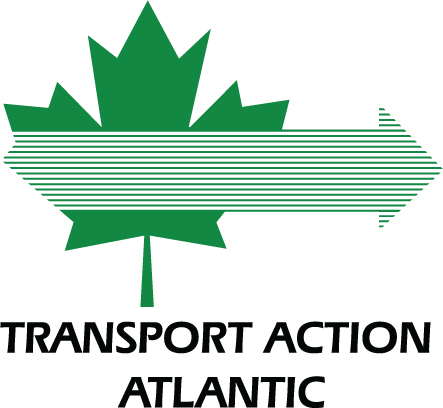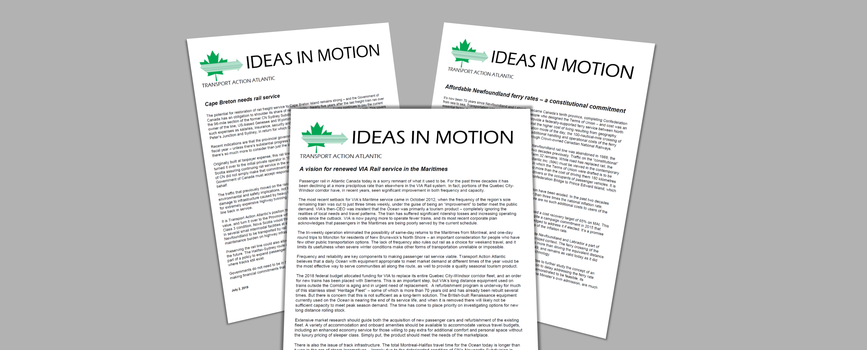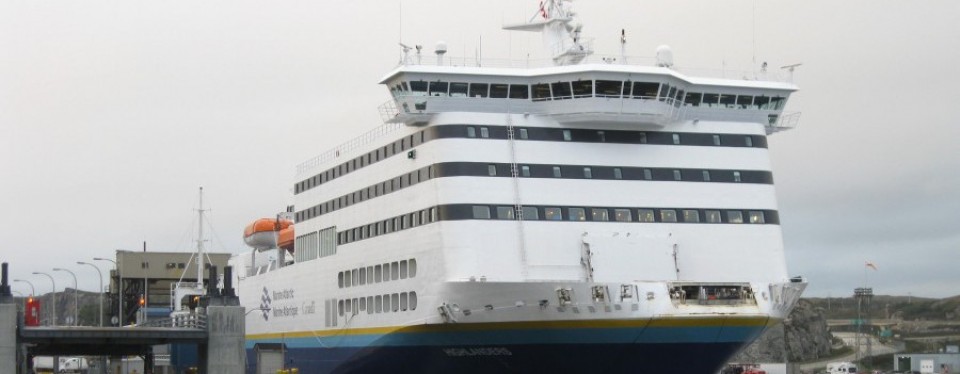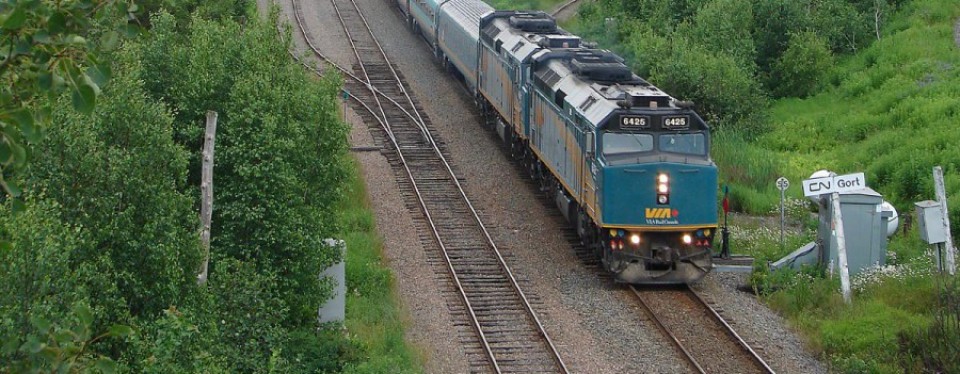Welcome to the September edition of Atlantic Transport News!
Here’s a look at what you’ll find in this edition:
- Scant attention to transportation in federal election campaign – TAA’s take on the election to date
- Responsibility for transportation policy unclear following NS election upset
- VIA Rail walks backward on service restoration plan
- Travel increased in August, despite COVID challenges
- Transit is on the road to recovery
- Marine Atlantic ferry plan hits rough seas
SCANT ATTENTION TO TRANSPORTATION IN FEDERAL CAMPAIGN

OUR TAKE ON THE FEDERAL ELECTION TO DATE
Transport Action Atlantic is a strictly non-partisan advocacy organization, but we do not hesitate to get involved in politics when the need or opportunity arises. This election is no exception.
Apart from the highly dubious need for a national vote at this time, it has been an incredibly short campaign. The electorate has had little time to examine and/or challenge the hastily prepared party platforms. TAA has therefore had limited opportunity to confront parties and candidates on the issues we believe to be important – matters of convenient, affordable and sustainable public transportation for Atlantic Canadians. Be that as it may, it is certainly disheartening that neither of the three major parties has so far been paying much – or any – attention to our agenda.
In the final week of the campaign we are attempting to stimulate some critical thinking, focusing particularly on certain closely-contested ridings where transportation issues just might make a difference on polling day. The matters where the federal government has jurisdiction or influence that are of ongoing concern to TAA are well-known to most of our readers:
- The sorry state of passenger rail in the Maritimes, and the gross neglect of our one remaining train by both VIA Rail management and their masters – the Government of Canada.
- The excessive cost recovery demands placed on Marine Atlantic’s Newfoundland ferry service – demands that Justin Trudeau referred to as “unreasonable” while in opposition.
- The federal government’s refusal to honour a written commitment to continuing rail service for Cape Breton made on its behalf three decades ago by the head of then Crown corporation CN.
- Ottawa’s reluctance to take leadership in rebuilding an integrated coast-to-coast motorcoach network for passengers and packages, and to assist existing operators through the pandemic.
- The absence of a commitment to the people of Campobello Island who must travel through the US for most of the year to access the Canadian services to which they are entitled.
Given that transportation is a major contributor to climate change because of carbon emissions, one might reasonably expect strong commitments to green transportation to be popping up like election signs. But that has not been the case. It’s almost as if the parties and candidates generally are consciously avoiding the subject. Perhaps, though, they sense that green initiatives don’t build the same kind of political capital as public spending to support the big climate culprits – highway and air transportation.
In the past several months, Ottawa has paid out well over $50 million to airports across Atlantic Canada to help offset their pandemic-related losses. At the same time, the two line-haul motorcoach companies in the region, Maritime Bus and DRL Coachlines, have come up empty-handed. Collectively these two for-profit operators have lost millions over the past 18 months, but are being told by the federal government that the newly-created Rural Transit Fund is not intended for them. The fact that the privately-owned buses kept providing essential public transportation services for both people and parcels through most of the pandemic while operating at a substantial loss doesn’t seem to matter.
“Everybody’s green – but they’re not sorting the garbage properly!” was the wry comment from Maritime Bus founder Mike Cassidy, who has become increasingly frustrated in his efforts to gain political support for his industry. Over the past several months he says he’s pursued every possible avenue in search of assistance, but to no avail.
Meanwhile, there’s been no indication of any pandemic funding for VIA Rail in Atlantic Canada. As reported elsewhere in this issue, the Ocean will remain on a token once-a-week schedule until at least November 15 – presumably with the approval of the Crown corporation’s political masters.
The Liberals are steadfastly refusing to address the Marine Atlantic cost recovery requirements imposed by the Harper Conservatives, despite commitments made during the 2015 campaign. Now they apparently only want to talk about a far-fetched proposal to build a tunnel under the Strait of Belle Isle, while ignoring the very real issue of today’s excessive ferry charges. And, surprisingly, the NDP – which championed the ferry rates issue as recently as last spring – has been strangely silent about it during this campaign.
Regardless of the election outcome, the reality is that TAA will need to work with new or re-elected members of the House of Commons of all political persuasions to advance the above agenda items, and others that may arise during the life of the new Parliament. That will be our priority throughout the fall and winter. Hopefully the threat of COVID-19 will wane as vaccination becomes widespread, and the opportunity for more in-person meetings will return.
-Ted Bartlett
RESPONSIBILITY FOR TRANSPORTATION POLICY UNCLEAR FOLLOWING NOVA SCOTIA ELECTION UPSET
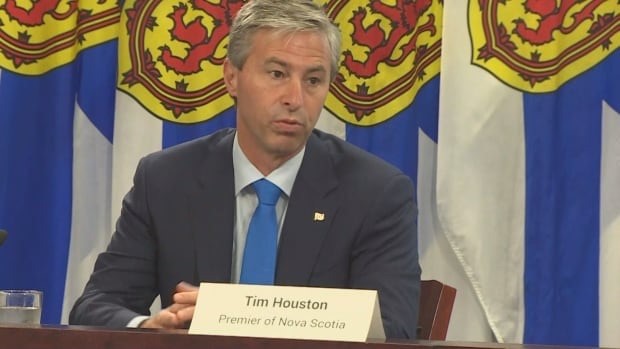
Nova Scotia Liberal Premier Iain Rankin gambled and lost by calling a summer pandemic election. On August 17 the Progressive Conservatives under Tim Houston pulled off an upset victory and won a majority mandate. The new government with 18 ministers was sworn in on August 31 – but not one of them carries the word “transportation” in their title.
TAA had been active in the campaign, asking parties and candidates to state their positions on various issues of concern. Unfortunately, the PC party was the only one that did not respond to a pre-election questionnaire, so the views of Premier Houston and his cabinet on such matters as the Cape Breton rail line, public transit, and reducing emissions from transportation remain unclear. In seeking to initiate dialogue with the new administration, there is some uncertainty at this point as to where actual policy responsibility on transportation matters resides in the restructured cabinet.
VIA WALKS BACKWARD ON SERVICE RESTORATION PLAN
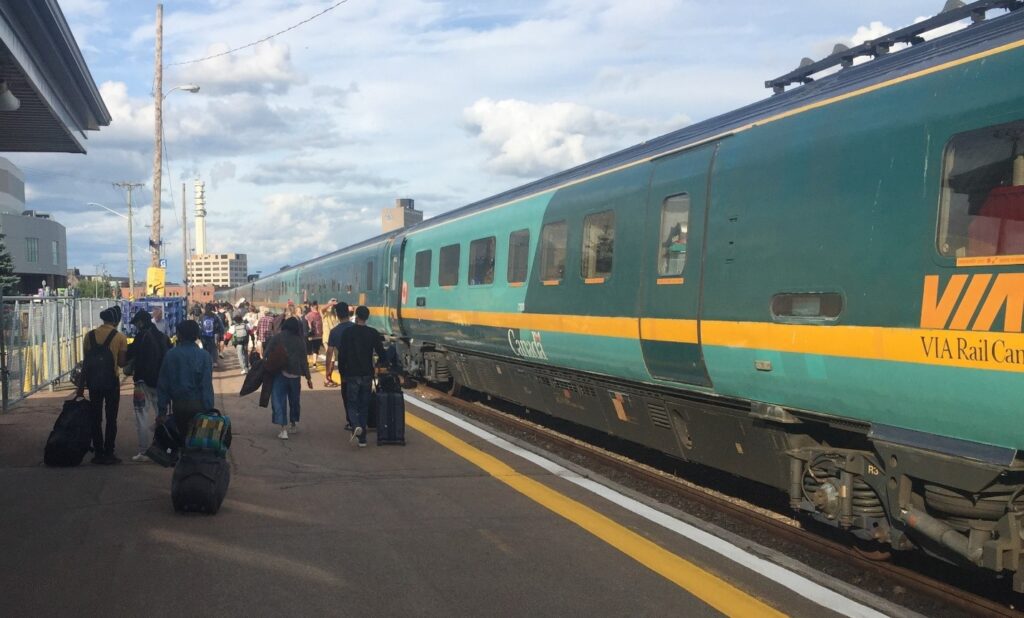
Would-be travellers who were expecting VIA Rail’s Ocean to be back on its usual tri-weekly schedule by early October are in for a big disappointment. The train returned as a bare-bones, once-a-week operation with reduced onboard amenities on August 11, after an absence of nearly 17 months. The plan, according to VIA management sources in mid-July, was to resume the normal pre-COVID schedule at the beginning of October, in the hope that pandemic restrictions would be sufficiently relaxed to permit restoration of the usual onboard food and beverage options by that time.
It was not to be. On September 2 Transport Action Atlantic was advised in an e-mail that the corporation is now intending to continue with just the single weekly trip until at least mid-November – with no promises for after that either. The was no public announcement, but the VIA website was updated shortly afterwards to reflect the change in plan.
The decision was blamed on ongoing COVID concerns. However, TAA says the excuse just doesn’t stand up to close scrutiny, coming just days after VIA restored nearly full pre-pandemic service levels in the Toronto-Ottawa-Montreal-Quebec City Corridor, where the average daily per-capita count of new cases is far higher than in the Maritimes. It would appear that there may be other factors at play, and lack of demand certainly doesn’t seem to be one of them. The day before the news broke, the crowd of passengers waiting to board the westbound Ocean at the Moncton station was similar to what one would expect to see at the peak of the Christmas travel season.
It might be a shortage of personnel, or maybe there are equipment challenges. There is only one train set in service at present, and perhaps all that’s VIA has available because their roster of rolling stock overall is in such bad shape. But that one trainset could easily make two round trips a week, or even five over a two-week span on an adjusted schedule. TAA is speculating company management may simply want to minimize their operational and/or payroll costs, without any consideration for the needs of Atlantic Canadians.
“This is just not good enough,” says TAA president Ted Bartlett. “Quite frankly, we are growing rather tired of excuses. Are we expected to believe that the smaller presence of COVID in the Maritimes represents a greater threat to public safety than the much larger per-capita case numbers in Ontario and Quebec?
“Presumably as a Crown corporation VIA would not be shortchanging Atlantic Canadians without the approval of the current federal government – which is rather astounding in the midst of an election campaign. But this cavalier attitude to anything east of Quebec City is unfortunately typical of VIA management and Transport Canada. We really have to make a public issue of it, and would be very interested to hear from election candidates on where they stand with respect to passenger rail in this part of the country.”
TRAVEL INCREASED IN AUGUST – DESPITE COVID CHALLENGES

Although dark and ominous clouds remain on the horizon, non-essential travel to, from and within Atlantic Canada showed signs of continuing recovery last month. Active COVID-19 caseloads in all four provinces showed upticks, especially in southeastern New Brunswick – prompting Nova Scotia to require all visitors entering from the west to show proof of vaccination at reinstated border checkpoints. Generally, though, the consensus from the tourism industry was that business in this challenging summer was exceeding expectations.
The travel restrictions continued to present challenges to the motorcoach industry, but even so Maritime Bus reports that ridership climbed to a daily average of 322 in August – considerably higher than had been anticipated, but still a long way from putting the beleaguered company in the black. Rather than add service on Saturdays, they chose to add extra departures on Fridays and Sundays, geared to weekend demand but with the travel needs of students particularly in mind. Apparently it worked, as 541 people bought tickets for Maritime’s coaches on the Friday preceding Labour Day weekend.
The airline industry likewise remains a long way from full recovery. By early September Halifax Stanfield Airport – the region’s busiest – was handling as many as 7000 passengers on some days. While that was a significant increase from a peak of 4000 at the beginning of August, it was still far behind the pre-pandemic daily average of about 12,000 travellers. The number of daily flights had reached 65 on average, a slight improvement month-to-month but a long way off the average of 200 arrivals and departures per day of two years ago.
Condor Airlines began a shortened twice-weekly seasonal service between YHZ and Frankfurt, Germany, on September 9, marking the first international activity in over 18 months. However, there’s no sign of any other international or trans-border flights returning in the immediate future.
“Air Canada has not announced resumption of any non-stop European routes to/from Halifax Stanfield, and their winter seasonal schedules, which would include sun destinations including Florida, has yet to be published,” reported airport spokesperson Tiffany Chase in an e-mail. She added that WestJet had just announced their intention resume non-stop service between Halifax and Glasgow in spring 2022, but there was apparently no mention of resuming service to Dublin or London Gatwick. Likewise, WestJet service to southern destinations this winter from YHZ has yet to be revealed.
TRANSIT IS ON THE ROAD TO RECOVERY
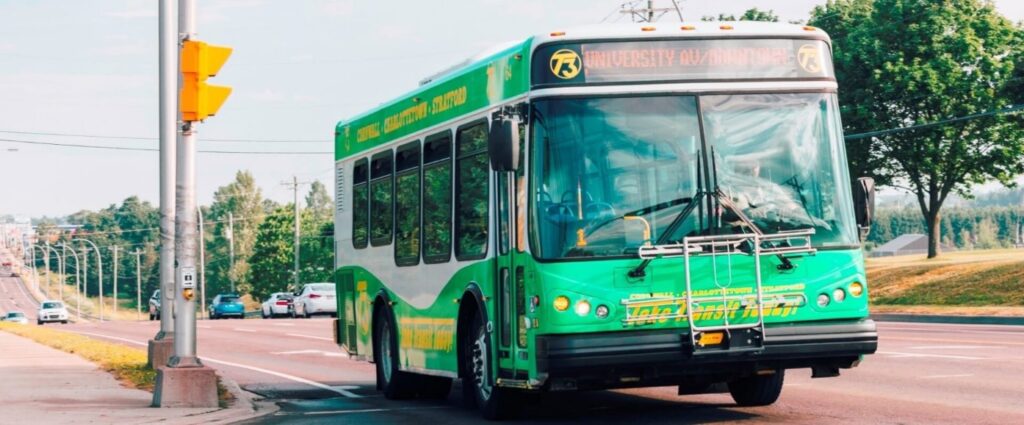
Transit users throughout the region appear to be growing more and more comfortable with the idea of taking the bus, and ridership numbers in most areas are continuing to show improvement. In some communities, schedules have still not returned to pre-pandemic levels, and the rules or recommendations regarding wearing of masks by both passengers and operators vary by location or province.
One system that is showing a strong post-pandemic recovery with very encouraging numbers is Charlottetown’s T3 Transit. On one red-letter day in early September, the number of fares passed the 2800 mark – the highest since the CVID-19 outbreak began. That number – impressive for a small city – compares very favourably with the average ridership of 3000 people per day in September of 2019.
Greater Moncton’s Codiac Transpo is one of the agencies that has still not resumed full service. With about 75% of what existed in early 2020 now being offered, there is still no firm plan in place for complete restoration, and a multi-step phased recovery approach has been adopted.
The tri-communities of Moncton, Riverview and Dieppe are now seeking the input of transit users to help guide their decision making. An online survey has been launched, and residents have until September 18 to submit their views.
Transit union spokesman Sheldon Phaneuf says asking the passengers for their views on how the system could be improved is a great idea – but he questions whether an online survey can fully cover the demographic that regularly rides the buses. He suggests that a grass-roots approach of meeting people face-to-face to get their opinions might be more effective.
MARINE ATLANTIC FERRY PLAN HITS ROUGH SEAS
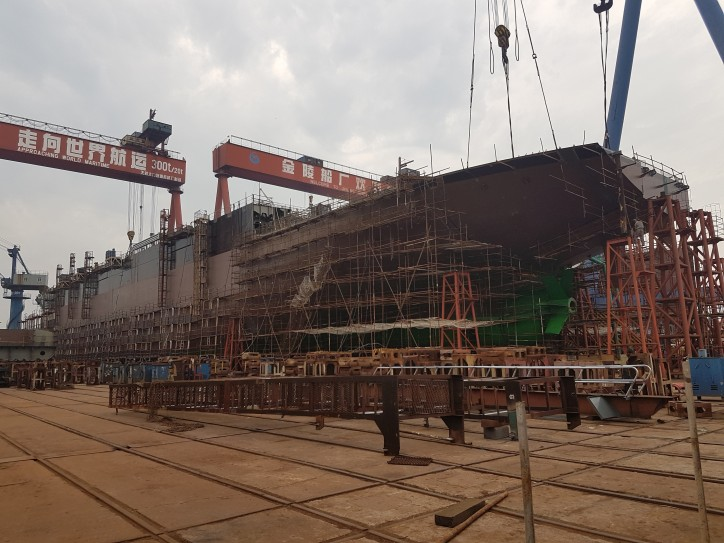
At first glance it seemed like a win-win situation, but the devil was lurking in the details.
In July, Marine Atlantic announced a five-year charter agreement with Stena North Sea Ltd. to supply a new Ro-Pax vessel for its Newfoundland fleet. Following the initial agreement, the federal Crown corporation will have an option to purchase the ferry. However there is no obligation to exercise that option, and should the new ship not meet expectations it can simply be returned to the owners after the five years have elapsed.
Problem is, Stena Line is planning to have the ship built in China’s state-owned and highly subsidized JinLing Shipyard, a detail that wasn’t mentioned in the initial media release. It’s no secret that this country currently has a particularly troubled relationship with the Chinese over the three-year imprisonment of two Canadian citizens on dubious espionage charges.
The story broke on the front page of the Globe and Mail on August 25, and very quickly became embroiled in political controversy. Canadian ship-building interests were quick to protest that the new ferry could have been built here at home. Whatever the merits of that claim, Prime Minister Justin Trudeau quickly distanced himself from the decision, saying he was troubled by the deal.
“We are concerned with this situation,” he told the newspaper, adding that his goal is for federal government purchasing to “align with our values.” But he also tried to deflect blame to the former Harper Government, suggesting that his predecessor should have made it a requirement of his national shipbuilding strategy in 2010 for Crown corporations to buy Canadian-built vessels.
Meanwhile, Shane McCloskey, policy director in Transport Minister Omar Alghabra’s office denied any responsibility in the matter. “The minister did not approve the contract…the minister was informed by the department as the procurement process was completed,” he wrote in an e-mailed statement to the Globe.
Likewise, Marine Atlantic denied any direct responsibility for the choice of shipyard. Communications manager Tara Laing said the ferry contract was open to domestic and international bidders and was overseen by an independent fairness monitor. “The ownership of the shipyard selected by Stena was not considered within the procurement process,” she told the newspaper in an e-mailed statement.
For their part, Erin O’Toole’s Conservatives vowed they would cancel the deal immediately if elected, and ensure the contract went to a Canadian shipyard.
Other media outlets also jumped on the story. The Toronto Sun editorialized that awarding the contract to China “is galling to any Canadian who supports justice, freedom and human rights,” while Saltwire columnist Teresa Wright wrote that “(Michael) Spavor and (Michael) Kovrig are political prisoners — Ottawa calls it ‘hostage diplomacy’ — in an increasingly tense showdown between Canada and China. So why does China get to benefit from hundreds of millions of dollars of our hard-earned tax dollars and build a ship for Marine Atlantic?”
Stena is a Swedish-based company, and is a major and widely-respected player in the European ferry industry. Marine Atlantic and its predecessor CN Marine has had a long-standing and largely amicable business relationship with them dating back nearly 50 years. Stena does not build ships, but contracts the construction to builders with established expertise in ferries, generally to Norwegian or German shipyards. That’s where three of the four vessels in Marine Atlantic’s current fleet came from. The Chinese connection – not Stena Line – is evidently the key issue in the uproar.
-Ted Bartlett
